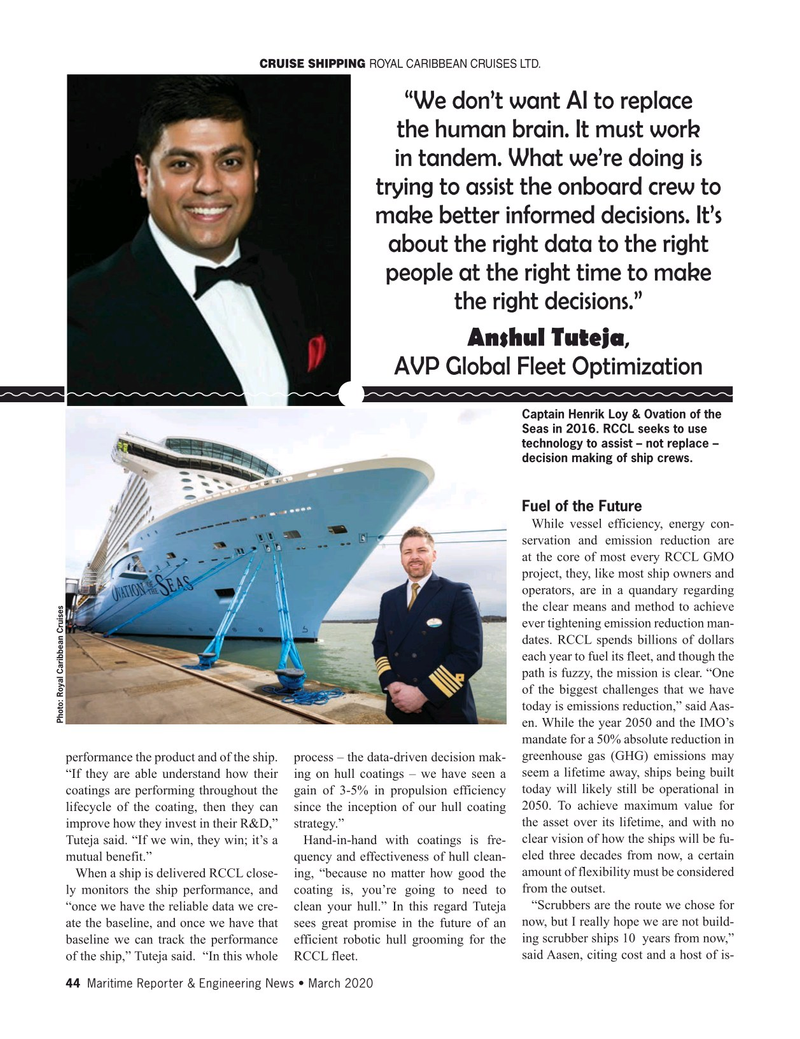
Page 44: of Maritime Reporter Magazine (March 2020)
Cruise Shipping Annual
Read this page in Pdf, Flash or Html5 edition of March 2020 Maritime Reporter Magazine
CRUISE SHIPPING ROYAL CARIBBEAN CRUISES LTD.
“We don’t want AI to replace the human brain. It must work in tandem. What we’re doing is trying to assist the onboard crew to make better informed decisions. It’s about the right data to the right people at the right time to make the right decisions.”
Anshul Tuteja,
AVP Global Fleet Optimization
Captain Henrik Loy & Ovation of the
Seas in 2016. RCCL seeks to use technology to assist – not replace – decision making of ship crews.
Fuel of the Future
While vessel efficiency, energy con- servation and emission reduction are at the core of most every RCCL GMO project, they, like most ship owners and operators, are in a quandary regarding the clear means and method to achieve ever tightening emission reduction man- dates. RCCL spends billions of dollars each year to fuel its fleet, and though the path is fuzzy, the mission is clear. “One of the biggest challenges that we have today is emissions reduction,” said Aas-
Photo: Royal Caribbean Cruises en. While the year 2050 and the IMO’s mandate for a 50% absolute reduction in greenhouse gas (GHG) emissions may performance the product and of the ship. process – the data-driven decision mak- “If they are able understand how their ing on hull coatings – we have seen a seem a lifetime away, ships being built coatings are performing throughout the gain of 3-5% in propulsion efficiency today will likely still be operational in lifecycle of the coating, then they can since the inception of our hull coating 2050. To achieve maximum value for the asset over its lifetime, and with no improve how they invest in their R&D,” strategy.” clear vision of how the ships will be fu-
Tuteja said. “If we win, they win; it’s a Hand-in-hand with coatings is fre- eled three decades from now, a certain mutual benefit.” quency and effectiveness of hull clean-
When a ship is delivered RCCL close- ing, “because no matter how good the amount of flexibility must be considered ly monitors the ship performance, and coating is, you’re going to need to from the outset.
“Scrubbers are the route we chose for “once we have the reliable data we cre- clean your hull.” In this regard Tuteja ate the baseline, and once we have that sees great promise in the future of an now, but I really hope we are not build- baseline we can track the performance efficient robotic hull grooming for the ing scrubber ships 10 years from now,” said Aasen, citing cost and a host of is- of the ship,” Tuteja said. “In this whole RCCL fleet.
44 Maritime Reporter & Engineering News • March 2020
MR #3 (34-49).indd 44 3/6/2020 2:21:59 PM

 43
43

 45
45
